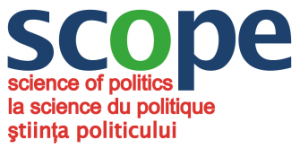 The Department of Political Science, International Relations and Security Studies in the University of Bucharest with the collaboration of the Centre for International Cooperation and Development Studies, organized the 3rd International Interdisciplinary Conference of Political Science, SCOPE, on May 26, 27 and 28 2006. In the panel Contemporary Security Approaches and the Human Rights Agenda, I presented my paper “Challenges for the protection of Human Rights defenders and vulnerable groups through nonviolent international interventions”.
The Department of Political Science, International Relations and Security Studies in the University of Bucharest with the collaboration of the Centre for International Cooperation and Development Studies, organized the 3rd International Interdisciplinary Conference of Political Science, SCOPE, on May 26, 27 and 28 2006. In the panel Contemporary Security Approaches and the Human Rights Agenda, I presented my paper “Challenges for the protection of Human Rights defenders and vulnerable groups through nonviolent international interventions”.
Human rights defenders work to induce positive social changes in their countries through peaceful means. In many occasions, their activities are implemented in contexts with serious conflicts affected by high degrees of political violence. In such contexts, civil society activists are regularly subjected to intimidation, harassment and attacks. Political violence contribute in this way to halt local social empowerment processes to transform those conflicts and prevent social changes. Therefore, overcoming this violence is fundamental for many individuals, organizations, and communities struggling to defend their rights and freedoms. In this context, part of the international civil global society, through some INGOs, has shown that it is possible to foster the protection of vulnerable Human Right defenders and vulnerable groups from direct violence in conflict areas around the world using exclusively nonviolent strategies. Those nonviolent international interventions allow the development of local social empowerment processes and, in this way, contribute to conflict transformation preventing further spread of violence.
This paper is based on a field research carried out in Colombia, Guatemala, México, Palestine and Israel which explored different experiences of nonviolent international interventions protecting vulnerable populations in high violent contexts. First, it aims to present those INGOs strategies implemented to prevent direct violence against Human Rights defenders. Second, it will analyse how local social empowerment processes are fostered as a result of the combined effect of violence deterrence, fear reduction, and visibility increase. Third, it will assess the main results achieved by these interventions and, finally, it will provide some reflections around the main challenges that nonviolent international interventions face to protect Human Right defenders and vulnerable groups.
